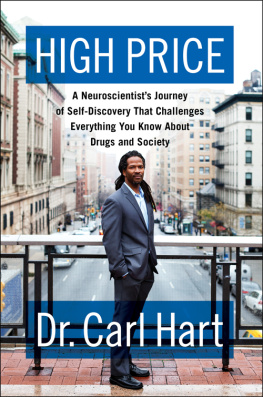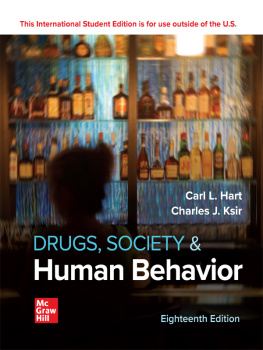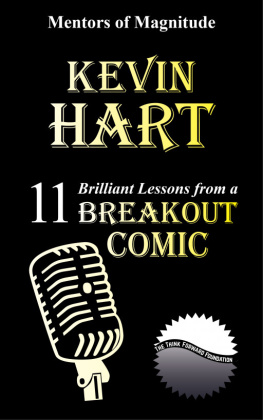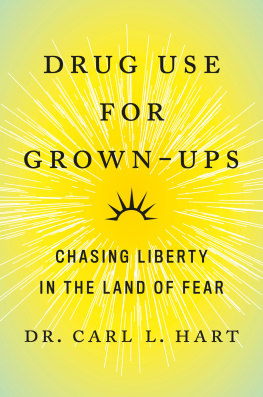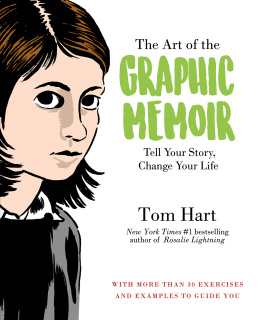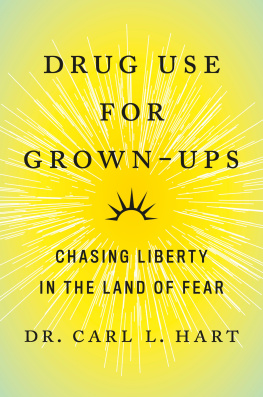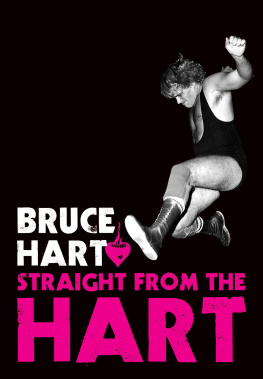High Price
A Neuroscientists Journey of Self-Discovery That Challenges Everything You Know About Drugs and Society
Dr. Carl Hart

For Damon and Malakai
Intellectuals... who have had the courage to voice their opposition have often paid a very high price.
TAHAR BEN JELLOUN
The thing that makes you exceptional, if you are at all, is inevitably that which must also make you lonely.
LORRAINE HANSBERRY
Contents
I m frequently asked why I wrote this book, a book that reveals many deeply personal details about my life. After all, Im an academic neuropsychopharmacologist who is trained to conduct research and teach a select group of students about drugs, behavior, and the brain. And there are few things that I value as much as my privacy. So, I certainly didnt write the book because I thought people should know more about my private lifethe vast amount of personal information revealed within these pages causes me a great deal of anxiety; nor did I write it to advocate illegal drug usethat would be a colossal waste of my training, skills, and talents. Currently, there are more than 20 million Americans who use illegal drugs regularly. I think its clear that Im not needed as an advocate.
The primary reason that I wrote this book was to show the public how the emotional hysteria that stems from misinformation related to illegal drugs obfuscates the real problems faced by marginalized people. This also contributes to gross misuses of limited public resources. To shed light on the relevant issuesincluding maladaptive human behaviors and misguided public policiesI use real-life examples, mainly from my own life. I hope this will help the reader to learn by example and then generalize more broadly. But I also recognize that inaccurate conclusions can be easily made if personal anecdotes alone are used. Thus, in addition to real-life examples, throughout the book I used scientific knowledge of the human mind, brain, and behavior in an effort to decrease the likelihood of the reader drawing inappropriate conclusions.
In an attempt to be as accurate as possible, I visited relatives and friends and recorded what they had to say. Some of these individuals names have been changed in an effort to protect their privacy. After absorbing the information Id learned from meeting with them, Id meet with the writer Maia Szalavitz, who helped me to put together a narrative that I thought would be interesting and digestible for a general audience. I gratefully acknowledge her assistance in explaining complex scientific findings and principles to a general readership, but I take full responsibility for any inaccuracy that may have resulted from oversimplification of complicated material.
It is my hope that after reading this book, you will be less likely to think about drugs in magical or evil terms that have no foundation in real evidence. As you will see in these pages, this has led to a situation where there is an unreasonable goal of eliminating illegal drug use at any cost to marginalized groups. Instead, I hope you, the reader, will come away with the ability to think more objectively and critically about the multitude of issues that come along with illegal drug use, and will understand that by applying what we have learned about human behavior, we can change it.
The paradox of education is precisely thisthat as one begins to become conscious, one begins to examine the society in which he is being educated.
JAMES BALDWIN
T he straight glass pipe filled with ethereal white smoke. It was thick enough to see that it could be a good hit, but it still had the wispy quality that distinguishes crack cocaine smoke from cigarette or marijuana smoke. The smoker was thirty-nine, a black man who worked as a street bookseller. He closed his eyes and lay back in the battered leather office chair, holding his breath to keep the drug in his lungs as long as possible. Eventually, he exhaled, a serene smile on his face, his eyes closed to savor the bliss.
About fifteen minutes later, the computer signaled that another hit was available.
No, thanks, doc, he said, raising his left hand slightly. He hit the space bar on the Mac in the way that hed been trained to press to signal his choice.
Although I couldnt know for sure whether he was getting cocaine or placebo, I knew the experiment was going well. Here was a middle-aged brother, someone most people would label a crackhead, a guy who smoked rock at least four to five times a week, just saying no to a legal hit of what had a good chance of being 100 percent pure pharmaceutical-grade cocaine. In the movie version, he would have been demanding more within seconds of his first hit, bug-eyed and threateningor pleading and desperate.
Nonetheless, hed just calmly turned it down because he preferred to receive five dollars in cash instead. Hed sampled the dose of cocaine earlier in the session: he knew what he would get for his money. At five dollars for what I later learned was a low dose of real crack cocaine, he preferred the cash.
Meanwhile, there I was, another black man, raised in one of the roughest neighborhoods of Miami, who might just as easily have wound up selling cocaine on the street. Instead, I was wearing a white lab coat and being funded by grants from the federal government to provide cocaine as part of my research into understanding the real effects of drugs on behavior and physiology. The year was 1999.
In this particular experiment, I was trying to understand how crack cocaine users would respond when presented with a choice between the drug and an alternative reinforceror another type of reward, in this case, cash money. Would anything else seem valuable to them? In a calm laboratory setting, where the participants lived in a locked ward and had a chance to earn more than they usually could on the street, would they take every dose of crack, even small ones, or would they be selective about getting high? Would merchandise vouchers be as effective as cash in altering their behavior? What would affect their choices?
Before Id become a researcher, these werent even questions that I would think to ask. These were drug addicts, I would have said. No matter what, theyd do anything to get to take as much drugs as often as possible. I thought of them in the disparaging ways Id seen them depicted in films like New Jack City and Jungle Fever and in songs like Public Enemys Night of the Living Baseheads. Id seen some of my cousins become shells of their former selves and had blamed crack cocaine. Back then I believed that drug users could never make rational choices, especially about their drug use, because their brains had been altered or damaged by drugs.
And the research participants I studied should have been especially driven to use drugs. They were experienced and committed crack cocaine users, who typically spent between $100 and $500 a week on it. We deliberately recruited individuals who were not seeking treatment, because we felt that it would be unethical to give cocaine to someone who had expressed an interest in quitting.
The bookseller was seated in a small, bare chamber at Columbia-Presbyterian Hospital (now New YorkPresbyterian) in upper Manhattan; his cocaine pipe had been lit by a nurse at his side with a lighter, who also helped monitor his vital signs during the research. I was watching him and several others in similar rooms through a one-way mirror; they knew we were observing them. And over and over, these drug users continued to defy conventional expectations.

